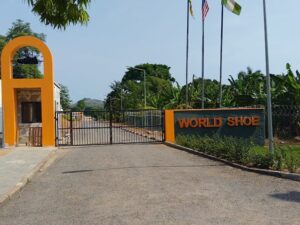Social Entrepreneurship is an area not well understood. For this reason, not many people like to tread on those grounds, but one man, Dr. Kojo Benjamin Taylor, a Ghanaian business mogul, who has remained unknown and unsung for a long time in Ghana, is giving real meaning to social entrepreneurship.
Ordinarily, a social entrepreneur, is one who decides to put his money into any investment that has the potential to solve community-based problems. These individuals are willing to take on the risk and effort to create positive changes in society. Evidence shows that social entrepreneurship is the way to go, if the United Nations’ Sustainable Development Goals (SDGs) are to be achieved.
In their study, “The role of social entrepreneurship in the attainment of the sustainable development goals,” published in Journal of Business Research, authors said, “despite the efforts undertaken by the United Nations to engage all public and private actors towards the achievement of the 2030 Agenda, the contribution of traditional businesses has been proved to be insufficient so far.”
“Social enterprises have thus emerged as an efficient alternative to meet social needs through entrepreneurial opportunities. However, the absence of specific tools to appraise the impact of social businesses on the fulfilment of the Sustainable Development Goals (SDGs) is a gap that this research aims to bridge by developing a novel rating system,” they added.
Dr. Taylor’s quest to help provide solution to social problems, saw him collaborating with the Ministry of Health to set up a public-private partnership that saw Sanford Health managing 24 clinics across Ghana, improving access to quality healthcare in urban and rural communities around the country, all with NHIS accreditation, to make affordable healthcare accessible.
Speaking at the launch of Sanford Health some time ago, he said “much of the rural populations in Ghana do not have access to basic care.” “The addition of these clinics will greatly change the scope of health care across the nation. Thousands of families will no longer be forced to travel for basic healthcare services.”
Asked what motivated him to give up an affluent lifestyle in the United States and move to Ghana, he said, “ I came to Ghana with a desire to become a social entrepreneur, leveraging on my business skills to alleviate systemic social problems of the country and help create economic vitality in Ghana and Africa”
As a Board Emeritus of Educate Tanzania Incorporated, Dr. Taylor supported the efforts of co-founders Jan B. Hanson and Stephen Hanson to establish KARUCO College in Karagwe.
Educate Tanzania ( ETI) currently partners with developing communities in Tanzania to promote and sustain social and economic prosperity through education. ETI has since erected Solar Array to provide power to KARUCO College and provided Micro-Enterprise Loans to jump-start businesses.
He moved back to Ghana in 2011 with his social national healthcare initiative through Sanford Health. Recently, he partnered with World Shoe Inc and as a co-founder of World Shoe Limited, he established World Shoe Factory at Akosombo to provide Ethylene Vinyl Acetate (EVA)- (a foam-like material created by mixing plastic-type substances ethylene and vinyl acetate)- shoes to help prevent contracting hookworm, which is one of the Neglected Tropical Diseases (NTDs).
Over the recent past NTDs have become a household name and Thoko Elphick-Pooley, the former executive director of Uniting to Combat NTDs, says, these diseases are a group of preventable and treatable diseases that affect about 1.65 billion people around the world, often living in remote communities.
“They cause immeasurable suffering. In addition, they debilitate, disfigure and can be fatal as well. NTDs create cycles of poverty and cost developing nations billions of dollars every year,” she added.

The World Shoe factory currently runs three shifts and produces 8,000 shoes a day, while maintaining 80% of its workforce from Akosombo and its environment and it is Dr. Taylor’s dream to tap into the $777 million that countries and global donors have pledged to the non-governmental organization, Reaching the Last Mile, to help defeat NTDs.
His partner in World Shoe, Mr. Manny Ohonme, a businessman and philanthropist, who was raised in Nigeria, has a story about his life. “As a child growing up in poverty, I experienced the power of a pair of shoes to transform lives,” he said.
Through World Shoe factory’s dream to produce footwear for those in areas where walking barefoot on soil contaminated by faeces can contract hookworm, Dr. Taylor hopes to end the disease. There is also podoconiosis, or endemic non-filarial elephantiasis, which is caused by exposure of the bare feet to irritant alkaline clay soil.
To avoid this, all you need is to keep your feet in shoes. Unfortunately, in some parts of Ghana and perhaps, Africa, poverty has made it impossible for some families to afford the cost of footwear for themselves and their children.
“More than half a billion people around the world do not have reliable access to quality footwear, leaving them vulnerable to injury and diseases that perpetuate a cycle of poverty,” said Dr. Taylor.
“We believe the new World Shoe factory will demonstrate how African innovation can propel African development and create change on a global scale. By creating a model to provide people with affordable, high-quality, eco-friendly shoes, we can support education, health and economic outcomes while protecting the environment,” he added.
World Shoe already has orders for 1.5 million pairs of shoes, vaulting the organization into perhaps the Top 20 social enterprises in the world. The company is a multinational social enterprise, producing innovative footwear in Africa for global retail markets and humanitarian requirements. The executives say they are dedicated to the vision that high-quality, low-cost footwear can unleash human potential, promote global health, and protect the environment.
They want to deliver millions of shoes to meet humanitarian needs in more than 100 countries, and they hope to achieve this through the use of creative designs, manufacturing, and cross-sector partnerships, to deliver market-based solutions to some of the world’s most urgent challenges. This looks viable because the NTDs that can be prevented with the use of shoes are spread across Africa and therefore the market for cheap and durable shoes is available.
At the end of the day, World Shoe will be financially sustainable, but the fact that it has decided to consider the social needs of a people, should spur others on to provide similar services. Those who can afford it should look at the production of highly nutritious foods that can help solve some of the balanced diet needs of many young people across the continent dying from malnutrition.
Dr. Taylor, who is one of eight siblings, started his journey into business in United States when he founded a technology services company and built that company into a $70 million franchised organization with 300 employees in 15 US cities. The company was later sold to a division of IDG Inc. (Publishers of Books For Dummies)
Under his leadership, the company he founded was twice recognized on the INC 500 listing as one of the fastest growing private companies in America. Metropolitan Economic Development Association (MEDA) distinguished Dr Taylor as “Entrepreneur of the Year.”
With a successful business career in America, Dr. Taylor moved back to Ghana, with a desire to look for sectors of opportunity to apply his business skills while helping to solve a social need of the country. Realizing the inequitable access to healthcare in the rural and peri- urban areas of Ghana, he ventured into healthcare, to help improve access to quality healthcare.
Dr. Taylor tapped on his business experience of growing a broad range of companies and utilized his franchising experience to set up a network of clinics in the urban and rural areas of Ghana to provide accessible and sustainable healthcare. His healthcare company, Micro-Clinic International, later partnered with Sanford Health, an integrated health system headquartered in the USA.
Taylor is hoping his commitment to social entrepreneurism will help drive innovation and systemic change by disrupting norms and existing systems to promote sustainable economic growth for the people of Akosombo and Ghana.
World Shoe Limited is thinking beyond creating a footwear industry in Ghana. The company wants to create a business enclave at Akosombo around healthcare, technology and other manufacturing industries that benefit from the synergy through foreign joint ventures.










